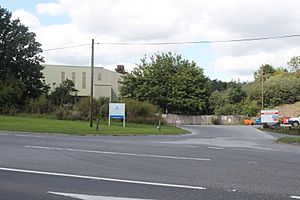Cloford Quarry facts for kids
| Site of Special Scientific Interest | |
 |
|
| Area of Search | Somerset |
|---|---|
| Coordinates | 51°11′53″N 2°24′18″W / 51.19811°N 2.40497°W |
| Interest | Geological |
| Area | 39.92 ha (98.6 acres) |
| Notification | 1994 |
Cloford Quarry is a special place in Somerset, England. It's a large area, about 39.92 hectares (that's like 100 acres!), located near the village of Cloford on the Mendip Hills. This site is officially called a "Site of Special Scientific Interest" (SSSI). This means it's protected because it has very important natural features, especially its unique rocks and fossils. It was given this special status in 1994.
Contents
Why Cloford Quarry is Special
Cloford Quarry is super important for understanding Earth's history. It shows us rocks from two ancient time periods: the Triassic and Jurassic ages. These rocks are found inside cracks, called fissures, within much older Carboniferous Limestone. This limestone was formed under the sea about 350 million years ago!
How the Rocks Formed
Imagine the Earth's crust moving and shifting. This movement caused the old Carboniferous Limestone to lift up, fold, and crack. Over millions of years, these cracks would open and close. When they were open, they filled up with sand, mud, and other materials from the Triassic and Jurassic seas. These materials then hardened into the different layers of rock we see today.
What We Find in the Rocks
Scientists can find rocks from many different time periods inside these fissures, including Rhaetian, Hettangian, Sinemurian, Pliensbachian, Toarcian, and Bathonian ages. The surface of the rocks also has many holes made by ancient molluscs (like snails or clams) that lived in the Jurassic seas. No other place in Britain has so many different kinds of these rock-filled cracks from this time!
Quarry Operations and Filming Location
People have been taking limestone from Cloford Quarry for a long time. In 2006, permission was given for the quarry to keep working until the year 2042.
Cloford Quarry is also famous for another reason! It was used as a filming location for the popular science fiction TV show Doctor Who. In the 1987 story Time and the Rani, the quarry became the alien planet Lakertya. You can see shots filmed here, including the outside of the villain Rani's laboratory!
 | James Van Der Zee |
 | Alma Thomas |
 | Ellis Wilson |
 | Margaret Taylor-Burroughs |

